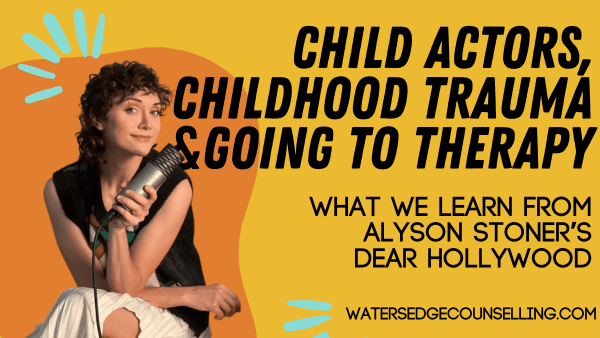
In a world of 90s sitcom reboots and throwback podcasts, the new series from actor Alyson Stoner is set apart. Known for their roles on Step Up, Cheaper By The Dozen and Camp Rock, the dancer, model, singer and entrepreneur is on a mission to transform celebrity culture with their series Dear Hollywood. And it comes after years of working on their own trauma, recovery from sexual abuse, an eating disorder and attachment issues.
So what does this have to do with the average everyday person? Most of us aren’t in the spotlight and couldn’t relate to growing up on film sets. But what makes Alyson’s approach so relatable is that they engage with us. This is about how we consume TV, follow celebrities, and form our identities around them. So, what do we learn from Dear Hollywood, and why does it matter?
- We learn that our childhood experiences shape our adult ability to set boundaries, establish identity, and develop healthy relationships.
Alyson’s life in the spotlight meant that they were trained to be available to everyone. They were the commodity and would supress their needs and wants to please others. It means Alyson has struggled to set boundaries in relationships and assert themself. And, as they became an adult, they had to unpack religious identity, sexual orientation and family responsibilities just like us…albeit in the spotlight. Our childhood experiences also instilled core beliefs in us. Are you a ‘people pleaser’? Do you struggle to trust people well? Maybe you’re the overly responsible one? Key experiences from your childhood shaped this, and as an adult it’s up to you to unpack it.
- We learn that the mind and body and intrinsically connected. What we perceive and what our bodies experience are linked, even if we ‘know’ we are not in a life-threatening situation.
A human brain is only fully formed at age 25 – before this, we are not able to fully comprehend or understand parts of our life. Our understanding increases with age, so for child actors, the ability to decipher their acted experiences from real life is incredibly difficult. This means they are traumatised by tragic, pivotal or scary scenes they partake in. Even becoming a character is a stretch – where is the line between who you are, and who you are playing? Just think about your favourite TV show growing up. In your mind, that actor WAS that character. And had you met them; you would have expected them to act in the same way. Throw in the role of social media so people always have to be ‘on’ and the role of marketing execs who sell your brand (in Alyson’s case, literally a doll), and it’s easy to lose yourself. Alyson even had plastic surgery as a consequence of this. That’s one of the reasons we see so many former child stars ‘go off the rails’ – they are traumatised and don’t necessarily have a safe place to heal. Can you relate?
- We learn that the media sells false beauty standards and storylines that even celebrities can’t live up to.
How many times have you seen a model on a billboard and compared your body to theirs? Or you’ve seen an influencer go live on Instagram with a makeup tutorial and they seem effortless and confident? Aside from the ‘magic’ of editing and lighting, the fact is that no one can live up to the perfection – we are just sold this so we keep buying products! A lot of us are aware of this, but we still feel the tug of comparison and fight to feel comfortable in our skin. For celebrities, and in the case of Alyson, the need to constantly become ‘perfect’ for a role lead to an eating disorder.
- We learn that our stories of healing can help other people
As kids, experiences are inflicted on us that we had no control over. And even as adults, there are things we are powerless to stop. For Alyson, this happened in the audition rooms of Hollywood. What is incredible about Alyson’s story, is that they reached out for help. They entered therapy and began to process and heal from a truckload of trauma, abuse and mental ill-health. Eventually, they chose to step away from the industry all together and began studying the connection between the mind and body. Today, we see Alyson reclaiming their story to educate others about the rights of child actors. Meanwhile, they are also breaking the stigma around mental illness. Our stories of healing and overcoming have the same ability to change people’s lives. It is a long journey – but gives us purpose on the toughest days.
Watch Dear Hollywood here (Note: Various episode have trigger warnings).
Do you struggle with comparison, or feel trapped by your childhood trauma? Is your child obsessed with a celebrity? Contact Colleen on 0434 337 245, Duncan on 0434 331 243 or Rachel on 0442177193 for a FREE 10-minute phone consultation on how we can best help you, or press book now and make an appointment.
The post Child actors, childhood trauma and going to therapy : what we learn from Alyson Stoner’s Dear Hollywood appeared first on Watersedge Counselling.
